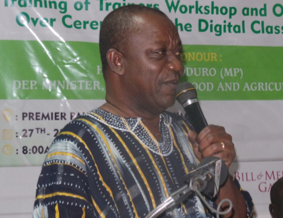Since the launch of government’s flagship programme ‘Planting for Export and Rural Development’ (PERD) in 2019, a total 15 million seedlings of cashew and other cash crops have so far been produced and distributed to farmers across the country, Deputy Minister for Food and Agriculture in charge of perennial crops, George Oduro, has said.
According to the Deputy Minister, this forms part of government’s commitment to building a viable cashew industry – especially raw material to attract and protect investments, thereby creating additional incomes and jobs for the people.
PERD has been rolled out to: promote the development of selected tree crops for diversified export earnings; boost production; promote rural economic growth; improve household incomes of rural farmers; and create a sustainable raw material base to support the decentralised industrialisation drive through the One District, One Factory (IDIF) initiative.
The Tree Crops Development Authority Act, 2019 (Act 1010), he indicated, has therefore been passed into law to establish an institution for the regulation and development of cashew and five other tree crops; adding “Preparations are currently ongoing to operationalise the Authority by end of the year”.
Mr. Oduro was speaking on behalf of the sector Minister, Dr. Owusu Afriyie Akoto, during the 14th African Cashew Alliance (ACA) Annual Cashew Conference’s opening session.
The theme for this year’s three-day virtual conference was ‘Building a viable cashew value chain to withstand market disruptions’. The conference brought together experts and industry players from both public and private sectors in Africa.
He recounted the cashew processing sub-sector’s importance in Africa and the adverse effect of the COVID-19 pandemic on it – causing some processors to shut-down operations, while most of them had to incur additional costs in order to implement COVID-19 protocols to stay afloat.
“Processing cashew in Africa serves as a source of employment for thousands of workers, with over 65% of them being women. With nearly 200,000 metric tonnes of raw cashew nuts processed in Africa during 2019, representing about 10% of the cashew production in Africa, there are over 40,000 jobs (estimated as 200 jobs per 1000 tonnes), which must be saved through the joint efforts of governments, development cooperation and our private sector partners,” he said.
A Cashew Expert and President of Cashew info, Srivatsva Ganapathy, advocated a collaboration between Africa and India to increase the cashew processing fortunes of both parties.
According to him, Africa’s cashew industry has massive potentials whereas India has an already-established processing sector, and a collaboration between the two would be mutually beneficial.
“Such a collaboration will increase the income of actors in Africa’s cashew industry, especially local processors, while also increasing India’s processing rate,” he explained.
On his part, Executive Director of the Consultative International Cashew Council (CICC), Andre Tandjekpon, called on stakeholders in the cashew industry to prioritise research as a catalyst to improve the industry on the continent.
“Research plays a crucial role in what will soon become of the cashew industry; prioritising it will make the industry stronger. There is a need for deliberate efforts and major investments into research aimed at improving seed quality and increasing production, as well as significantly increasing the rate of processing in Africa. Research is highly relevant in cashew processing. India is what it is today because of in-depth research,” he said.
He affirmed the commitment of CICC to research within the cashew industry of Africa and beyond, indicating that it is collaborating with research institutions and Non-Governmental Organisations (NGOs) in that regard.










